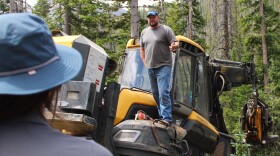-
KUNC's Alex Hager rode nearly 50 miles on the Poudre River trail and learned about the wildlife, people and farms that use its water along the way.
-
The Coalition for the Poudre River Watershed is asking for volunteers to help gather pine cones for wildfire restoration.
-
Crews are removing trees along Michigan Ditch near Cameron Pass to prevent wildfire and protect water in the Poudre River.
-
Colorado State University engineering students are testing dam safety on a large model of the soon-to-be-built dam at Halligan Reservoir.
-
The Northern Integrated Supply Project, or NISP, is close to construction, but building costs are in the billions and some towns are cutting back on the share of water they'll store in its reservoirs.
-
Greeley is piecing together a plan to reconnect and restore the Poudre River by getting out of its way — and making it a recreation destination. Listen to Morning Edition host Michael Lyle, Jr. discuss this story with Colorado Sun Team Editor David Krause and then read The Colorado Sun story at the link below.
-
A massive new reservoir project in Northern Colorado has cleared a final hurdle, more than two decades after it was originally proposed. Today on In The NoCo, KUNC’s water reporter Alex Hager explains how this will supply enough water for a half-million new residents in fast-growing communities in the region – and why some environmental advocates opposed the project.
-
An environmental group sought to block construction of the Northern Integrated Supply Project near the Poudre River.
-
The City of Fort Collins says the final segment in city limits to connect the 45-mile trail is near completion. The paved path is decades in the making.
-
Biologists were on hand to meet with families to explore what lives below the surface of the Cache La Pourdre River in Fort Collins. The event was just one of many across the state of Colorado this weekend. Many events are still happening in the coming days. Find out more at Latino Conservation Week.

Play Live Radio
Next Up:
0:00
0:00
Available On Air Stations










